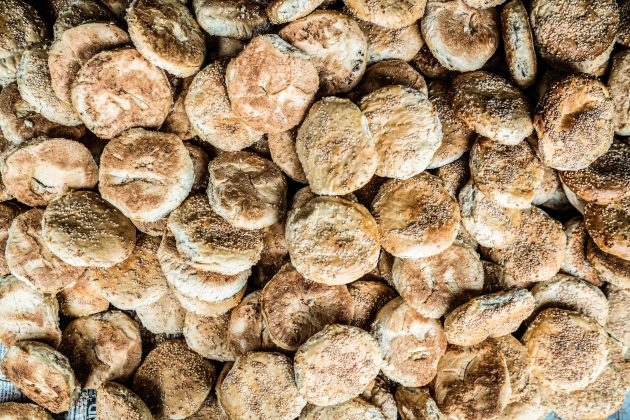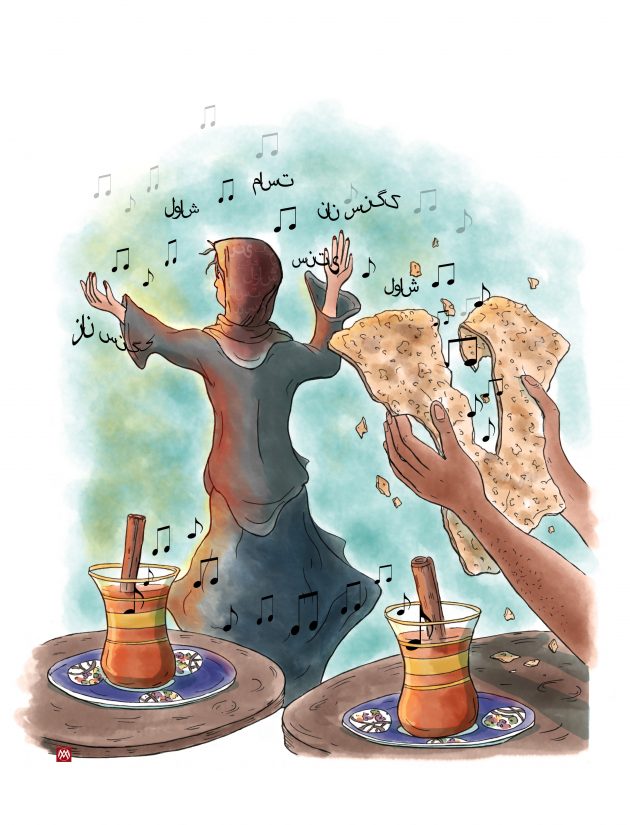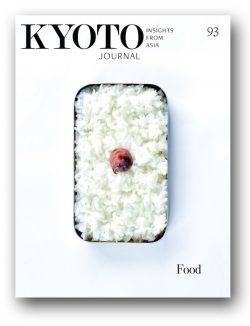
I don’t know why I’ve come to fall in love with this address. It’s non-descript, in the decidedly non-descript way that non-descript often is. And yet, these frequent instances of flair, shy at first, more persuasive as we’ve begun to discern each other…
There’s the crackle as the front door swings open, a sound buried in nostalgia and the aural inquisitions that memory tends to instigate. There’s the gramophone atop the counter, kept to one side, a silent spectator as old Persian classics emanate softly from a somewhat mismatched modern radio. The sun’s rays are another element in this strange affair, filtering through the large glass windows of the café with an elegance that soon has everything – patrons, furniture, upholstery, ruminations – dappled in that orange flood afterglow of burn and bloom. And at the heart of it all, there she is, chief rabble-rouser in this opera of mysteries.

I have come to believe that she is channeling Toscanini with her hands. Equally, I’m firm in the conviction that she is channeling a fabled Persian songstress with her soul. Her hands, a riotous melee of ebb and flow, are tempered by an assured cadence that I can only think of as meditative. And surely this is as much a concerto as anything ever put to score and the legibility of music sheets, this early morning conjuring of dough, this circadian dispersal of orders and commendations to her two trusty lieutenants, this daily repartee between flour, wheat, yeast, and rise. Then there’s the riddle, the one aspect to this saga that continues to confound me. Old Ms. Nargess, make no mistake, has everything and everyone wired to a string.
At the start of each working day, the pattern remains the same, yet is no less mesmerizing for it: paper-thin nan-lavash, the Persian flatbread of Armenian origin, is birthed and thereafter summoned at recurrent intervals. The breakfast regulars tear into it with the fervor of schoolchildren; they know well how the delicate creature dries out quickly and takes on the brittleness of a storied schoolmaster in no time. The black pepper and sesame-flecked earthiness of eggs made to order, the preponderance of yoghurt bearing thick Persian accents, and the café’s assortment of fresh dips ripe with the fragrances of strawberry and pomegranate orchards form worthy confidantes to the lavash’s rather fragile moods. Whether being molded to encompass a sandwich wrap filling or being baked for that instant longer so that hummus, goat cheese, and olive oil can all reside peacefully on its hardened avatar, the lavash is the focal point of life at this early hour.
While bakeries in Iran stick to baking just the one specialty bread, Ms. Nargess and her eponymous café have no such qualms; they happily wade into another crowd favorite. The whole-wheat flatbread made from sourdough – sangak – is bred on a bed of hot river stones in a dome-shaped brick oven overtly zealous of its culinary treasures. None of this is in plain view of me, or any of the café’s customers. It’s only when the door to the baking enclave inside swings open from time to time, that I’m privy to these snatches of the secrets within. From the same table that has become a habit over the past month, I’m granted a visible, if unacknowledged, audience with the goings-on. I don’t participate, I watch. Wood and coal infiltrate the oven. Hands and voices unite in their one pursuit. Ms. Nargess’s lilting intonation rises above the clamor of heat and waft. That one mystery lingers like a persistent halo. And thus, I suppose, is magic born.
But it is when Ms. Nargess steps back out into the sun-kissed glow of Café Nargess that the opera truly settles into its own. Whether behind the counter or mingling amongst the patrons, many with whom she now shares the close rapport of friendship and familial chiding, her aura is palpable. It’s in her eyes, a-sparkle at the commencement of a fresh conversation; it’s in her hands, sweeping and swaying as she recounts another story from her box of yesterdays; it’s in the hair speckled with ample kisses of grey – a few strands of which keep peeking out from beneath her hijab – which she brushes away from time to time with the insouciance of Catherine Deneuve shooing away the paparazzi; and it’s in the voice, that beautiful voice framed with swirls and accented with just the faint echo of something resembling regret – the fountain to the one abiding mystery that I can’t quite shake off.
She sings, you see. At all times. If she’s not mouthing the words to some ditty or other, she’s humming a tune. It seems to me that the only time this activity ceases is when she’s shouting out an order to her staff or conversing with the patrons. I’ve never come across someone so bound to song – rhythm, verse, chorus, and all. I have no idea what she might be replicating. Beautiful Persian songs from a time gone by, surely; songs holding some deep resonance with her, with this café, and with this land, possibly. I once tried to forage an answer from a man who was, clearly, a regular. To tide over discrepancies in language, I kept things simple. Pointing to Ms. Nargess, I uttered – “Song, Iranian song, Persian song?” He shook his head firmly and flashed a toothless grin, before returning to his newspaper. I’ve tried to unearth the mystery of these songs and her almost mystical attachment to them a few times, without any success. In this way, the mystery lingers; gradually, my need to solve it grows.
Why am I here, in this café? What force of nature compelled my feet towards the city of Isfahan? What flicker of divine provenance instigated my heart towards Iran and an escape from myself? Am I fleeing the embers of a relationship, broken and buried beneath the nineteen million fragrances and fallacies that invoke Bombay? Am I fleeing the residues of a career burnt and memories of past failures that keep raising their heads like unwelcome guests? Is the thought of familiarity and its ensuing footsteps of formulaic predictability eating into my soul? Is this flight, in the end, a forced reaction to a woman and the hopes we had once nourished, together?
Iran had seemed a worthy choice; far, but not all that far; somewhat foreign, but not entirely anonymous; fleeting, yet not altogether ephemeral. Bound to my homeland, India, by the persistent threads of history and the fabric of cultural familiarity, it made itself known as my only real choice. And Isfahan, tethered to the ghosts of Hafez and bearing its own silent melancholy from the past, appeared to be a kindred escapist. That was a month ago. I was expecting isolation. I was hoping for aloneness. What I hadn’t accounted for was this café and its matriarch, instilling in me the adamant will to not just awake, but arise.
Each time fresh loaves of bread are brought out, the aroma fills me with the desire to be. This isn’t ordinary bread; it’s unlike anything I’ve ever tasted. It seems to hold the essence of the earth within its flaky, crumbly folds; each bite, thus, takes me into the heart of an Isfahan where eleven bridges of majestic provenance still crisscross lives and neighborhoods, where the ghost of Shah Abbas the Great prowls the chambers and the courtyards of the monumental mosques I come across on my daily walks, where the poetry of Hafez is still looked upon as a foreteller of the future. All morning, customers come in and walk out with mounds of crumbly, doughy nan-lavash and nan-sangak – the twins forming the heartbeat of every breakfast, and with it, every household. Their accomplices aren’t far behind either.
Pots and kettles stir in movement, and soon, magic of another kind is afoot. Ms. Nargess is indulging this land’s favorite preoccupation – tea – with the loving care usually accorded a preferred niece or nephew. The water rumbles. Her voice rises. Cups and saucer inked with art too fragile to bear duly emerge. The copper, bronze, and silver arrogances of the samovar arrives. And soon enough, the flourishes: petals from different flowers, depending on the tea you’ve chosen; a dash of rose, a kiss of lavender; a tablespoon of golab, or rosewater; pods of green cardamom; a stick or two of darchin, the cinnamon that’s such an attachment for the people here; and finally, small freckles of saffron, to imbue that necessary longing.
Ms. Nargess brings me my tea herself. She offers a smile that I’ve come to cherish; a smile draped in that precious commodity of warmth. She’s warmed up to me, slowly, over this past month. As have the other regulars and the unfailingly Iranian clientele of the café. They know me as the Indian wanderer, of no place. I’m often greeted with playful yells of ‘Amitabh Bachchan!’ and ‘Shah Rukh Khan!’ – Bollywood’s powerful emotional bond cutting through concepts of distance with ease. They speak barely any English, and my Farsi is punctuation rather than conversation. But I’ve found that a greeting of Salaam, a divinity-induced goodbye of Khoda Hafiz, the regard to men as Aga, and to women as the dipped-in-romance lilt of Khanum, are often enough. We don’t talk much; but we get by.
It’s also clear to me now that the café I once thought non-descript is anything but. It’s nearly full nearly all the time, with the soft murmur of conversation infusing its own color to this crisp winter air. The walls, a pale turquoise borrowed from the archives of time, are dotted with art depicting scenes from volumes that I can only guess belong to Rumi and Hafez. Some poster art, new at one time, now rendered vintage without it ever being a conscious decision, is here too. The old wood furniture has a dignity about it; like an old uncle with impeccable manners, it compels you to be on best behavior. And then the few framed photographs: a woman, a couple, a family portrait, all kissed with the dreamy melancholy of the bygone; hauntingly, there is the seeped in black-and-white poignancy of a young woman captured in a lost gaze – Ms. Nargess in her twenties, her almond-shaped eyes and fragile beauty piercing through the camera’s gaze and the consequences of time.
Three days ago, though, my equation with Café Nargess changed. I heard a fresh voice originating from the oven enclave. Soon, its owner emerged. It was as though I was staring at Ms. Nargess, but a younger version of her, in fact, the very same face that stared out compellingly from the black-and-white portrait. It could only be her daughter. I was transfixed; from viewing Café Nargess as a figment of some forlorn poet’s imagination, I was now seeing it a breathing entity – fresh, alive. It was she who came around to take my order.
“You’re Ms. Nargess’s daughter?” I asked simply.
“Yes,” she replied, with a smile. “And you’re the Indian wanderer.”
We both smiled.
“No one here knows your name.”
“Each day, it’s a different Indian actor’s name,” I offered.
She laughed, spreading the café with something tangible, a lease of life.
“It’s Kabir, actually.”
“Nice to meet you, I’m Taraneh.”
When Taraneh returned a while later with my tea imbued with the blood of rose, she again had a smile on her face.
“My mother’s very fond of you, you know,” she said.
“I’m very fond of her too,” I replied. “And of this café which she’s created.”
“Oh, my grandparents created this,” Taraneh replied, looking around the café. “Enjoy your tea.”
In the couple of days since, Taraneh has come to inhabit Café Nargess’s spaces as though she’d always been here. She helps out at times; at times, she simply takes a table by the window and savors her chai. We’ve talked often, and I’ve come to learn that she’s been working as an art consultant in Berlin, but has been feeling the strange need lately to return home. She doesn’t know what the future holds for her, and in that sense, we’re kindred.
As I walk into Café Nargess this morning, I see that my customary table has two sets of chai on it, waiting. Taraneh is sipping from one of them. She waves out to me.
“Mum thought I should join you for some chai. She worries that you’re always alone in here.”
“I’m sorry you got pushed into this.”
“Oh, I wanted to.”
Ms. Nargess sees us, and smiles. She moves on with the day’s business, her voice filled with a melody.
“Always singing,” I marvel aloud. “Your mother, she’s really in love with these old Persian songs, isn’t she?”
Taraneh laughs aloud. “They aren’t songs. They’re recipes.”
Seeing me wide-eyed, she explains.
“The breads we bake here, they aren’t the ordinary kind. They’re created from my grandma’s special recipes. People come down from Tehran and up from Shiraz for our breads, did you know? My mother needs to hold on, to the breads, to the special way honey floods our fresh strawberry jam, to the special way apricots kiss our homemade yoghurt, to how pistachios, saffron, and rosewater enrich our custard ice-cream – the bastani akbar mashti… these are family relics, she needs to hold on.”
I lean back in my chair. I take a deep breath. Taraneh looks towards the window, lost in a stream of thought.
“The custom here has always been to remember the recipes by heart,” she continues. “But my mother…” Her slender fingers fidget over the table’s dark wood. “She needs the extra help, the singing is the only way for her to remember.”
“Why is that?” I ask, careful not to intrude too deep.
“Her memory has been failing her ever since my father died seven years ago,” Taraneh replies. “Alzheimer’s. She once wrote the recipes down, but then forgot where she’d kept them. I’ve told her several times that I’ll write them down again. But no; now she sings, that’s the only way…”
I stay silent as Taraneh’s emotions swell into a silent flood.
“She always wanted to be a singer. But then she knew that my grandparents secretly always wished that she’d take over the café – this place, named after her… for her.” Taraneh’s eyes flinch at a miscreant tear. “Some legacies can’t be denied, I guess…”
I watch as Ms. Nargess glides through her café in a gentle wave of melody and life. I meditate on this legacy she’s carried forth, here on Hafez Street, deep in the heart of an Isfahan tormented by the past. My senses are aflutter with beauty: the gas burner flickering to life under a kettle; the fabric of Iran’s chaikhanehs and their tea-adhering tendencies; the weight of legacies, themselves bound to memory. I see Taraneh smiling at me. I see Bombay, I see Isfahan. I hear a song. And I perceive hope, doused in the inexplicable profundity of dough.
Header photo: Robert van Koesveld www.robertvankoesveld.com
Illustration: Alex Mankiewicz www.alexmankiewicz.com


SIDDHARTH DASGUPTA is an Indian poet & novelist. His words have appeared in a gamut of global literary journals—Litro, Entropy, Cha, Punch, The Bombay Literary Review, Coldnoon, and Burning House included. As part of his dual life, he also undertakes cultural immersions with the likes of Travel + Leisure, National Geographic Traveller, and Harper’s Bazaar. Siddharth has three books to his name thus far; the short story collection The Sacred Sorrow of Sparrows and the poetry collection The Wanderlust Conspiracy both emerged in 2017-18, and have been met with strong critical acclaim. You may follow Siddharth’s journeys—literary and otherwise—via citizenbliss.squarespace.com and @citizen.bliss
Header image of tandoor bread in Leh by Robert van Koesveld https://www.robertvankoesveld.com/
Illustration by Alex Mankiewicz www.alexmankiewicz.com